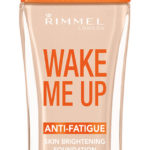Buying a new foundation is confusing enough when you’re just trying to figure out the right shade for your skin tone. Then you throw in terms like ‘HD’, ‘light perfecting’ and ‘micropigments’, and it’s just too much to comprehend. All you want is a foundation that will make your skin look flawless. WHY DOES IT HAVE TO BE SO DIFFICULT?
It doesn’t (and shouldn’t), so we’re here to help make the whole foundation buying process a hell of a lot easier by decoding some common foundation terms – from technologies used to formulations and finishes.
Dewy finish
The formulation will leave your skin looking radiant and glowing – almost like you have a natural shine that’s not too oily. This kind of foundation works best on normal to dry skin as well as mature skin types as it makes the complexion look healthier and more vibrant. If you have oily skin but like a dewy finish, you can always use a mattifying primer under foundation to control excess shine.
Matte finish
Foundations that offer a matte finish are usually water-based formulations. They also often contain oil-absorbing ingredients to eliminate shine, making them perfect for those with oily or combination skin.
Try: Rimmel London Stay Matte Foundation
Sheer coverage
The lightest coverage you can get, as sheer coverage formulations contain the least amount of pigment. Usually more like a tinted moisturiser or BB cream, sheer coverage foundations even out skin, but don’t do much to cover pigmentation, freckles or blemishes.

Light coverage
A step up from sheer, light coverage foundations contain more pigment, meaning they cover any unevenness a bit more. They may be able to cover very slight discoloration, but your freckles are likely to still be visible.
Medium coverage
Medium coverage foundations help to even out skin tone and cover most skin imperfections.
Full coverage
With a full coverage foundation, you’ll be able to cover up scars, pigmentation, acne, redness and other skin imperfections.
Buildable coverage
Some foundations layer better than others, so a foundation that offers buildable coverage will allow you to apply a few layers without the result looking caked-on or unnatural.
Try: Rimmel London Lasting Finish 25 HR Dual Finish Powder Foundation
Lightweight foundation
There’s a difference between lightweight foundation and foundation that offers a light finish. Lightweight refers to how the foundation feels on your skin, whereas light finish refers to how it looks. So you can have a medium coverage foundation that feels lightweight (i.e. doesn’t feel heavy) on your skin.
Oil-based foundation
Oil-based foundations tend to be quite thick in texture and can offer more coverage. They’re best for those with normal or dry skin.
Water-based foundation
These foundations are usually oil-free and a great option for those who have oily skin and suffer from shine.

Silicone-based foundation
Usually lighter in texture, but not necessarily lighter in coverage. Silicone-based foundations tend to be more watery but offer good coverage for those who need it. They also blend easily and don’t settle into lines.
Alcohol-based foundation
Alcohol-based foundations generally contain more water for sheer coverage and a lightweight feel that doesn’t clog pores.
HD foundation
This is quite a new terminology in the foundation world. It basically means that the formulation leaves your skin looking flawless and camera-ready. Light-reflecting ingredients like mica, silicone, and crystals help to diffuse light and create an illusion of an even finish. They also tend to offer great hydrating benefits.
Transfer-proof/resistant foundation
Transfer-proof foundation stays put – even when you take off your shirt and expect to see foundation marks on the collar. This kind of foundation sets quickly, so you have to be quite efficient with your blending. It’s a great option come summer when heat and humidity send foundation sliding.
Water-resistant foundation
It’s important to understand that water-resistant and waterproof are different. Waterproof means the foundation won’t budge when you’re doing things like swimming, sweating and wandering around in the rain (as you do…), while water-resistant can withstand a lot of moisture, but may slip and slide if you immerse your head in water. Water-resistant foundation is also easier to remove than waterproof.
Light-perfecting foundation
A foundation that is completely undetectable, no matter what lighting you’re in. Rimmel London Match Perfection contains technologies to ensure the foundation blends perfectly with your skin tone (more on that in a bit).
Light-reflecting particles
Light-reflecting particles in a foundation help the light bounce off your skin, leaving you with a complexion that looks even, radiant and glowing.
Try: Rimmel London Wake Me Up Foundation
Micropigments
Micropigment technology works to smooth away and conceal imperfections and fine lines, so skin appears brighter and smoother.
SMART TONE Technology
Some foundations use incredibly clever technology to help the shade adjust to your natural skin tone. Rimmel London Match Perfectioncontains SMART TONE Technology, which instantly mimics your skin’s texture and tone for superior blendability.

Are there any other foundation terms you find confusing? What are the main things you look for in a foundation?








